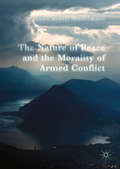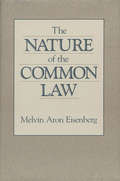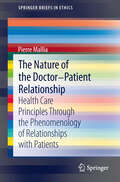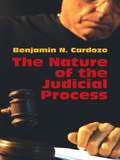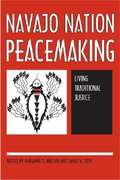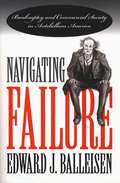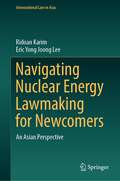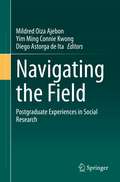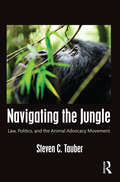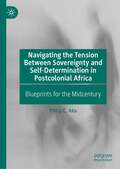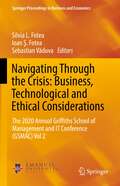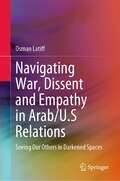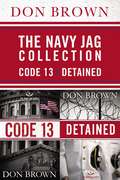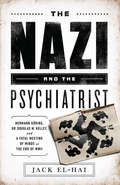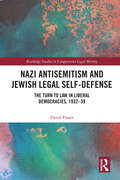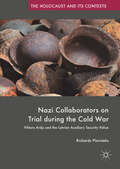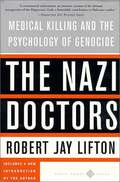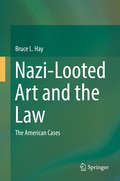- Table View
- List View
The Nature of Peace and the Morality of Armed Conflict
by Florian Demont-BiaggiThis book explores topical issues in military ethics by according peace a central role within an interdisciplinary framework. Whilst war and peace have traditionally been viewed through the lens of philosophical enquiry, political issues and theological ideas - as well as common sense - have also influenced people's understanding of armed conflicts with regards to both the moral issues they raise and the policies and actions they require. Comprised of fourteen essays on the role and application of peace, the book places emphasis on it's philosophical, moral, theological, technological, and practical implications. Starting with an overview of Kantian perspectives on peace, it moves to discussions of the Just War debates, religious conceptualizations of peace, and the role of peace in modern war technology and cyber-security. Finally concluding with discussions of the psychological and medical impacts of war and peace on both the individual and the larger society, this collection offers a contribution to the field and will be of interest to a wide audience. Chapters 4, 6 and 10 of this book are available open access under a CC BY 4. 0 license.
The Nature of Supreme Court Power
by Matthew E. K. HallFew institutions in the world are credited with initiating and confounding political change on the scale of the United States Supreme Court. The Court is uniquely positioned to enhance or inhibit political reform, enshrine or dismantle social inequalities, and expand or suppress individual rights. Yet despite claims of victory from judicial activists and complaints of undemocratic lawmaking from the Court's critics, numerous studies of the Court assert that it wields little real power. This book examines the nature of Supreme Court power by identifying conditions under which the Court is successful at altering the behavior of state and private actors. Employing a series of longitudinal studies that use quantitative measures of behavior outcomes across a wide range of issue areas, it develops and supports a new theory of Supreme Court power. Matthew E. K. Hall finds that the Court tends to exercise power successfully when lower courts can directly implement its rulings; however, when the Court must rely on non-court actors to implement its decisions, its success depends on the popularity of those decisions. Overall, this theory depicts the Court as a powerful institution, capable of exerting significant influence over social change.
The Nature of the Common Law
by Melvin EisenbergMuch of our law is based on authoritative texts, such as constitutions and statutes. The common law, in contrast, is that part of the law that is established by the courts. Common law rules predominate in some areas of law, such as torts and contracts, and are extremely important in other areas, such as corporations. Nevertheless, it has been far from clear what principles courts use—or should use—in establishing common law rules. In this lucid yet subtly argued book, Melvin Eisenberg develops the principles that govern this process. The rules established in every common law case, he shows, are a product of the interplay between the rules announced in past precedents, on the one hand, and moral norms, policies, and experience, on the other. However, a court establishing a common law rule is not free, as a legislator would be, to employ those norms and policies it thinks best. Rather, it can properly employ only those that have a requisite degree of social support. More specifically, the common law should seek to satisfy three standards. First, it should correspond to the body of rules that would be arrived at by giving appropriate weight to all moral norms, policies, and experiential propositions that have the requisite support, and by making the best choices where norms, policies, and experience conflict. Second, all the rules that make up the body of the law should be consistent with one another. Third, the rules adopted in past precedents should be applied consistently over time. Often, these three standards point in the same direction. The central problems of legal reasoning arise when they do not. These problems are resolved by the principles of common law adjudication. With the general principles of common law adjudication as a background, the author then examines and explains the specific modes of common law reasoning, such as reasoning from precedent, reasoning by analogy, drawing distinctions, and overruling. Throughout the book, the analysis is fully illustrated by leading cases. This innovative and carefully worked out account of the common law will be of great interest to lawyers, law students, students in undergraduate legal studies programs, scholars interested in legal theory, and all those who want to understand the basic legal institutions of our society.
The Nature of the Doctor-Patient Relationship
by Pierre MalliaThis book serves to unite biomedical principles, which have been criticized as a model for solving moral dilemmas by inserting them and understanding them through the perspective of the phenomenon of health care relationship. Consequently, it attributes a possible unification of virtue-based and principle-based approaches.
The Nature of the Judicial Process (The Storrs Lectures Ser.)
by Benjamin N. CardozoA distinguished jurist provides insights into the judicial role by asking and answering the question, "What is it that I do when I decide a case?" In this legal classic, Benjamin N. Cardozo — an Associate Supreme Court Justice of the United States from 1932-38 — explains a judge's conscious and unconscious decision-making processes.Cardozo handed down opinions that stressed the necessity for the law to adapt to the realities and needs of contemporary life. Famous for his convincing and lucid prose, he offers insights that remain relevant to a modern view of American jurisprudence. In simple, understandable language, he discusses the ways that rulings are guided and shaped by information, precedent and custom, and standards of justice and morals.Four of Cardozo's lectures appear here, bookended by an introduction and conclusion. They explore a variety of approaches to the judicial process: the method of philosophy; the methods of history, tradition, and sociology; the method of sociology and the judge as a legislator; and adherence to precedent and the subconscious element in the judicial process. Ideal for law students as well as anyone interested in legal theory, this volume offers a rare look inside the mind of a great jurist.
Nature's Trust
by Mary Christina WoodEnvironmental law has failed in its most basic purpose. Even as ecosystems collapse across the globe and climate crisis intensifies, environmental agencies worldwide use their authority to permit the very harm that statutes were passed to prevent. This book exposes the dysfunction of environmental law and offers a transformative approach based on the public trust doctrine. An ancient and enduring principle, the public trust doctrine empowers citizens to protect their inalienable property rights to crucial resources. It holds government to a fiduciary obligation to protect such natural assets as generational inheritance for all citizens. Although the public trust has long offered a theoretical ideal for environmental law, until now it has lacked the precision necessary for citizens, government employees, legislators, educators, and judges to apply it to a broad realm of issues. This book shows how a trust principle can apply from the local to global level to protect the planet.
Navajo Nation Peacemaking: Living Traditional Justice
by Marianne O. Nielsen James W. ZionNavajo peacemaking is one of the most renowned restorative justice programs in the world. Neither mediation nor alternative dispute resolution, it has been called a horizontal system of justice because all participants are treated as equals with the purpose of preserving ongoing relationships and restoring harmony among involved parties. In peacemaking there is no coercion, and there are no sides. No one is labeled the offender or the victim, the plaintiff or the defendant. This is a book about peacemaking as it exists in the Navajo Nation today, describing its origins, history, context, and contributions with an eye toward sharing knowledge between Navajo and European-based criminal justice systems. It provides practitioners with information about important aspects of peacemakingÑsuch as structure, procedures, and outcomesÑthat will be useful for them as they work with the Navajo courts and the peacemakers. It also offers outsiders the first one-volume overview of this traditional form of justice. The collection comprises insights of individuals who have served within the Navajo Judicial Branch, voices that authoritatively reflect peacemaking from an insiders point of view. It also features an article by Justice Sandra Day OConnor and includes contributions from other scholars who, with the cooperation of the Navajo Nation, have worked to bring a comparative perspective to peacemaking research. In addition, some chapters describe the personal journey through which peacemaking takes the parties in a dispute, demonstrating that its purpose is not to fulfill some abstract notion of Justice but to restore harmony so that the participants are returned to good relations. Navajo Nation Peacemaking seeks to promote both peacemaking and Navajo common law development. By establishing the foundations of the Navajo way of natural justice and offering a vision for its future, it shows that there are many lessons offered by Navajo peacemaking for those who want to approach old problems in sensible new ways.
Navigating Failure
by Edward J. BalleisenThe "self-made" man is a familiar figure in nineteenth-century American history. But the relentless expansion of market relations that facilitated such stories of commercial success also ensured that individual bankruptcy would become a prominent feature in the nation's economic landscape. In this ambitious foray into the shifting character of American capitalism, Edward Balleisen explores the economic roots and social meanings of bankruptcy, assessing the impact of widespread insolvency on the evolution of American law, business culture, and commercial society.Balleisen makes innovative use of the rich and previously overlooked court records generated by the 1841 Federal Bankruptcy Act, building his arguments on the commercial biographies of hundreds of failed business owners. He crafts a nuanced account of how responses to bankruptcy shaped two opposing elements of capitalist society in mid-nineteenth-century America--an entrepreneurial ethos grounded in risk taking and the ceaseless search for new markets, new products, and new ways of organizing economic activity, and an urban, middle-class sensibility increasingly averse to the dangers associated with independent proprietorship and increasingly predicated on salaried, white-collar employment.
Navigating Nuclear Energy Lawmaking for Newcomers: An Asian Perspective (International Law in Asia)
by Ridoan Karim Eric Yong LeeThis book provides a comprehensive overview of the legal and regulatory framework for the nuclear industry from an Asian perspective. It includes information on the history of nuclear lawmaking, the key international treaties and agreements that govern the use of nuclear energy, the role of national and regional regulatory bodies, and the legal and policy issues that arise in the development and operation of nuclear power plants. The book also covers topics such as nuclear safety, security, waste management, environmental protection, and liability for nuclear accidents. Additionally, it provides insights into the legislative process and the various stakeholders involved in nuclear lawmaking, such as industry, government, and civil society organizations. The overall goal of this book is to provide a detailed and up-to-date understanding of the legal and regulatory framework for the nuclear newcomers, particularly in Asia, and to help readers navigate this complex and dynamic field.The book is also used as a guide for all nuclear energy-producing countries, lawmakers, students, researchers, or even for general readers to understand the perspectives of international nuclear energy law.
Navigating the Field: Postgraduate Experiences in Social Research
by Mildred Oiza Ajebon Yim Ming Connie Kwong Diego Astorga de ItaThis volume is a collation of postgraduate fieldwork experiences in social research that provides a platform for early career researchers (ECRs) to be open about the hidden labour of doing postgraduate fieldwork. This book documents diverse fieldwork experiences, gathering critical reflections on ‘the field’ from a wide range of ECRs. The issues presented here go from the process of identifying the field to navigating life in (and after) it, including things that happen in-between. This text shows a different set of methodological considerations in relation to access, ethics, identity, positionality, power and practices, highlighting how ECRs' fieldwork experiences may help broaden traditional frameworks of research. Exploring how postgraduate researchers make sense of these issues and what kind of decisions they make in specific circumstances helps to reveal broader concerns, institutional practices and constraints. Through these reflections, this book makes an important point that there is a need for researchers to document the ‘real story’ behind fieldwork. The honesty and openness of contributors in this volume are positive steps towards fostering a research culture where reflections upon weaknesses and failures are as welcome as presentations of successful fieldwork techniques and methods.The fact that this book is written and edited by ECRs, the topics it presents — both emerging and long-debated but still relevant — and the broad range of approaches make this text unique. We hope these points will make this work useful for researchers of all levels and across disciplines, and that this text will allow the reader to rethink some essential aspects of social research that are often taken for granted. We expect the diverse reflections offered in this book to appeal to researchers across disciplines at different stages of their career and that this will be a useful resource for researchers to map and navigate their own research pathways.
Navigating the Fundamentals of Immigration Law
by Grace E. AkersThis book is designed as a "core curriculum" handbook, focusing on the fundamental elements of immigration law and practice.
Navigating the Jungle: Law, Politics, and the Animal Advocacy Movement
by Steven C. TauberFor much of our history, legal scholars focused predominantly on the law's implications for human beings, while ignoring how the law influences animal welfare. Since the 1970s, however, there has been a steep increase in animal advocates' use of the courts. Animal law has blossomed into a vibrant academic discipline, with a rich literature that examines how the law affects animal welfare and the ability of humans to advocate on behalf of nonhuman animals. But most animal law literature tends to be doctrinally-based or normative. There has been little empirical study of the outcomes of animal law cases and there has been very little attention paid to the political influences of these outcomes. This book fills the gap in animal law literature. This is the first empirically-based analysis of animal law that emphasizes the political forces that shape animal law outcomes.
Navigating the Tension Between Sovereignty and Self-Determination in Postcolonial Africa: Blueprints for the Midcentury
by Philip C. AkaThis book addresses the unique challenges faced by Africa regarding peaceful self-determination. Unlike other regions, Africa has seen limited success in nonviolent self-determination campaigns. Since 1989, only three African nations - Namibia, Eritrea, and South Sudan - have joined the UN after enduring prolonged and violent struggles for independence. In a world characterized by constant change, border alterations typically require armed conflicts in postcolonial Africa. In response to this disconcerting trend, the book offers pragmatic blueprints for achieving peace, emphasizing constitutional approaches to navigate the delicate balance between sovereignty and self-determination. The work delves into the complexities of five self-determination struggles spanning three African countries, providing valuable insights into the challenges faced. It distils six critical lessons from these case studies and presents fourteen blueprint proposals tailored to address the unique dynamics of postcolonial Africa, where reconciling sovereignty and self-determination remains a pressing concern.
Navigating Through the Crisis: The 2020 Annual Griffiths School of Management and IT Conference (GSMAC) Vol 2 (Springer Proceedings in Business and Economics)
by Silvia L. Fotea Ioan Ş. Fotea Sebastian VăduvaThis proceedings volume provides a multifaceted perspective on the unprecedented crises generated by the global COVID-19 pandemic, and its ramifications for individuals, businesses, organizations, governments and systems in developing countries. Featuring selected papers from the 2020 Annual Griffiths School of Management and IT Conference (GSMAC), held in Oradea, Romania, this volume focuses on business, technological and ethical considerations in the process of navigating through a global crisis. It analyzes the effectiveness of different measures taken at individual, organizational and country level and outlines potential scenarios and solutions for the new post-crisis reality. Finally, the book provides diagnosis and recommendations for managerial practice in various industries impacted.
Navigating War, Dissent and Empathy in Arab/U.S Relations: Seeing Our Others in Darkened Spaces
by Osman LatiffThis book focuses on American political discourse connected to war, dissent, and empathy. Through interdisciplinary methods of history, politics and media studies, the book examines ways in which American self-identity alters as a consequence of media portrayal of human suffering and of its existential others. It compares representations of the Iraq wars to earlier precedents and looks at the work of American activists, assessing how narratives and images of human suffering in new media iconography generate empathic attitudes towards others. This comparative, multimodal study helps to explain shifting self-identities within the U.S, and relationally through the representation of the Arab other presenting an original and historicised contribution to the media-war field of academic and public debate. The book underscores empathy as a vibrant category of analysis that expands how we think about West-Arab relations, revealing how understanding the cultural aspects of this conflictual interrelationship needs to be broadened.
The Navy Jag Collection: Detained and Code 13
by Don BrownCode 13Caroline is just getting her feet wet at the prestigious Code 13, but is thankful for at least one familiar face—her old flame, P.J. MacDonald. He loops her into the assignment he is currently working on—the legality of a proposed drone-sharing contract with Homeland Security that would allow the sale of drones for domestic surveillance. The contractor wants a legal opinion clearing the contract for congressional approval. But the mob wants the proposal dead-on-arrival.DetainedA man and his son dreamed of America’s freedom, but the dream became a nightmare when they ended up at Guantánamo Bay.
The Nazi and the Psychiatrist: Hermann Göring, Dr. Douglas M. Kelley, and a Fatal Meeting of Minds at the End of WWII
by Jack El-HaiIn 1945, after his capture at the end of the Second World War, Hermann Göring arrived at an American-run detention center in war-torn Luxembourg, accompanied by sixteen suitcases and a red hatbox. The suitcases contained all manner of paraphernalia: medals, gems, two cigar cutters, silk underwear, a hot water bottle, and the equivalent of $1 million in cash. Hidden in a coffee can, a set of brass vials housed glass capsules containing a clear liquid and a white precipitate: potassium cyanide. Joining Göring in the detention center were the elite of the captured Nazi regime-Grand Admiral Dönitz; armed forces commander Wilhelm Keitel and his deputy Alfred Jodl; the mentally unstable Robert Ley; the suicidal Hans Frank; the pornographic propagandist Julius Streicher-fifty-two senior Nazis in all, of whom the dominant figure was Göring. To ensure that the villainous captives were fit for trial at Nuremberg, the US army sent an ambitious army psychiatrist, Captain Douglas M. Kelley, to supervise their mental well-being during their detention. Kelley realized he was being offered the professional opportunity of a lifetime: to discover a distinguishing trait among these arch-criminals that would mark them as psychologically different from the rest of humanity. So began a remarkable relationship between Kelley and his captors, told here for the first time with unique access to Kelley’s long-hidden papers and medical records. Kelley’s was a hazardous quest, dangerous because against all his expectations he began to appreciate and understand some of the Nazi captives, none more so than the former Reichsmarshall, Hermann Göring. Evil had its charms.
Nazi Antisemitism and Jewish Legal Self-Defense: The Turn to Law in Liberal Democracies, 1932–39 (Routledge Studies in Comparative Legal History)
by David FraserOne of the first to provide a socio-legal comparative history of under-studied or ignored Jewish attempts in the 1930s "Anglosphere" to counter the rise in fascist and Nazi antisemitism, this book examines the ways in which Jewish individuals and organized communal bodies in the mid-to-late 1930s sought to counter this increasing antisemitic violence, physical and verbal, by using the law against their fascist and Nazi attackers. This is the first study to explore how Jews in these countries organized themselves, brought their oppressors to court, while seeking to convince their governments that an attack on Jews was a threat to the social order. The book analyzes the networks of knowledge and the personal relationships between and among key actors and institutions of the "Antisemitic International." Nazi "nationalists" always participated in networks that transcended borders. Case studies from Canada, South Africa, the United Kingdom, and the United States, illustrate the ways in which different mechanisms of Jewish resistance were deployed throughout the mid-to-late 1930s. They embody significant concerns about the "turn to law" and the importance of litigation and legislation. Grounded in original archival research on three continents, the book examines the ways in which professional legal discourse about public order and democratic citizenship proffered by Jewish communities and individual Jews was countered by their Nazi opponents with legal and political arguments about "truth," "persecution," and Jewish perfidy. The book will be of interest to students, academics, and researchers working in the areas of Legal History, History, Jewish Studies, the study of Antisemitism, and the History of the far right, fascism and Nazism.
Nazi Billionaires: The Dark History of Germany's Wealthiest Dynasties
by David de Jong“A provocative group portrait of five industrialists who expanded their fortunes by colluding with Hitler and then, after World War II, walked away with minimal punishment and barely a dent in their bottom lines... In this meticulously researched book, Mr. de Jong, an investigative journalist and former reporter at Bloomberg News, compels us to confront the current-day legacy of these Nazi ties."—The Wall Street JournalA groundbreaking investigation of how the Nazis helped German tycoons make billions off the horrors of the Third Reich and World War II—and how America allowed them to get away with it.In 1946, Günther Quandt—patriarch of Germany’s most iconic industrial empire, a dynasty that today controls BMW—was arrested for suspected Nazi collaboration. Quandt claimed that he had been forced to join the party by his archrival, propaganda minister Joseph Goebbels, and the courts acquitted him. But Quandt lied. And his heirs, and those of other Nazi billionaires, have only grown wealthier in the generations since, while their reckoning with this dark past remains incomplete at best. Many of them continue to control swaths of the world economy, owning iconic brands whose products blanket the globe. The brutal legacy of the dynasties that dominated Daimler-Benz, cofounded Allianz, and still control Porsche, Volkswagen, and BMW has remained hidden in plain sight—until now.In this landmark work of investigative journalism, David de Jong reveals the true story of how Germany’s wealthiest business dynasties amassed untold money and power by abetting the atrocities of the Third Reich. Using a wealth of untapped sources, de Jong shows how these tycoons seized Jewish businesses, procured slave laborers, and ramped up weapons production to equip Hitler’s army as Europe burned around them. Most shocking of all, de Jong exposes how America’s political expediency enabled these billionaires to get away with their crimes, covering up a bloodstain that defiles the German and global economy to this day.
Nazi Collaborators on Trial during the Cold War
by Richards PlavnieksThis book is a study of the legal reckoning with the crimes of the Latvian Auxiliary Security Police and its political dimensions in the Soviet Union, West and East Germany, and the United States in the context of the Cold War. Decades of work by prosecutors have established the facts of Latvian collaboration with the Nazis during the Holocaust. No group made a deeper mark in the annals of atrocity than the men of the so-called 'Arajs Kommando' and their leader, Viktors Arājs, who killed tens of thousands of Jews on Latvian soil and participated in every aspect of the 'Holocaust by Bullets. ' This study also has significance for coming to terms with Latvia's encounter with Nazism - a process that was stunted and distorted by Latvia's domination by the USSR until 1991. Examining the country's most notorious killers, their fates on both sides of the Iron Curtain, and contemporary Latvians' responses in different political contexts, this volume is a record of the earliest phases of this process, which must now continue and to which this book contributes.
The Nazi Doctors: Medical Killing and the Psychology of Genocide
by Robert LiftonIn his most powerful and important book, renowned psychiatrist Robert Jay Lifton presents a brilliant analysis of the crucial role that German doctors played in the Nazi genocide. Now updated with a new preface, The Nazi Doctors remains the definitive work on the Nazi medical atrocities, a chilling exposé of the banality of evil at its epitome, and a sobering reminder of the darkest side of human nature.
Nazi Hunter: The Wiesenthal File
by Alan LevySimon Wiesenthal spent four and a half years in Mauthausen concentration camp during World War II. With the exception of his wife, all his immediate family were exterminated, and he himself ended the war a living skeleton. Since then, he has achieved international reknown for his tireless and successful tracking down of Nazi war criminals, including notorious figures such as Eichmann, the 'desk murderer' who masterminded Hitler's Final Solution; Stangl the overlord of Treblinka; and the Mengele of Auschwitz, the dreaded 'Angel of Death'. To this day his work continues, his motivation simply expressed in the words: 'Justice, not vengeance'. This work provides an account of Wiesenthal's inspired detective work.
Nazi Hunter: The Wiesenthal File
by Alan LevySimon Wiesenthal spent four and a half years in Mauthausen concentration camp during World War II. With the exception of his wife, all his immediate family were exterminated, and he himself ended the war a living skeleton. Since then, he has achieved international reknown for his tireless and successful tracking down of Nazi war criminals, including notorious figures such as Eichmann, the 'desk murderer' who masterminded Hitler's Final Solution; Stangl the overlord of Treblinka; and the Mengele of Auschwitz, the dreaded 'Angel of Death'. To this day his work continues, his motivation simply expressed in the words: 'Justice, not vengeance'. This work provides an account of Wiesenthal's inspired detective work.
Nazi-Looted Art and the Law
by Bruce L. HayThis book offers a clear, accessible account of the American litigation over the restitution of works of art taken from Jewish families during the Holocaust. For the past two decades, the courts of the United States have been an arena of conflict over this issue that has recently captured widespread public attention. In a series of cases, survivors and heirs have come forward to claim artworks in public and private collections around the world, asserting that they were seized by the Nazis or were sold under duress by owners desperate to escape occupied countries. Spanning two continents and three-quarters of a century, the cases confront the courts with complex problems of domestic and international law, clashes among the laws of different jurisdictions, factual uncertainties about the movements of art during and after the war, and the persistent question whether restitution claims have been extinguished by the passage of time.Through individual case studies, the book examines the legal questions these conflicts have raised and the answers the courts have given. From the internationally celebrated “Woman in Gold” lawsuit against Austria to lesser-known claims against Germany, Hungary, Spain, and museums and private collections in the United States, the book synthesizes the legal and evidentiary materials and judicial rulings in each case, creating a coherent narrative of proceedings that are often labyrinthine in complexity. Written by a leading authority on litigation and procedure, the book will be of interest to readers in various fields of the humanities and social sciences as well as law, and to anyone interested in the fate of artworks that have been called the “last prisoners” of the Second World War.
Nazi War Crimes, US Intelligence and Selective Prosecution at Nuremberg: Controversies Regarding the Role of the Office of Strategic Services
by Michael SalterReviewing recently declassified CIA documents, this book provides a balanced but critical discussion of the contribution of American intelligence officials to the Nuremberg war crimes trials. Giving new details of how senior Nazi war criminals, such as SS General Karl Wolff, were provided with effective immunity deals, partly as a reward for their wartime cooperation with US intelligence officials, including Allen Dulles, former CIA Director, the author also discusses the role of such officials in mobilizing the unique resources of a modern intelligence agency to provide important trial testimony and vital documentary evidence. Nazi War Crimes, US Intelligence and Selective Prosecution at Nuremberg argues that both war crimes prosecutors and intelligence officials can engage in mutually beneficial collaborations, but that both sides need to recognize and appreciate the problems that may arise from the fact that these institutions are required to operate according to different, and in some cases contradictory, agendas. This topical book gives those studying, or with interests in, international law, criminal law and history an insight into the debates surrounding international war crimes, within the context of the Nuremberg war crimes trials.
